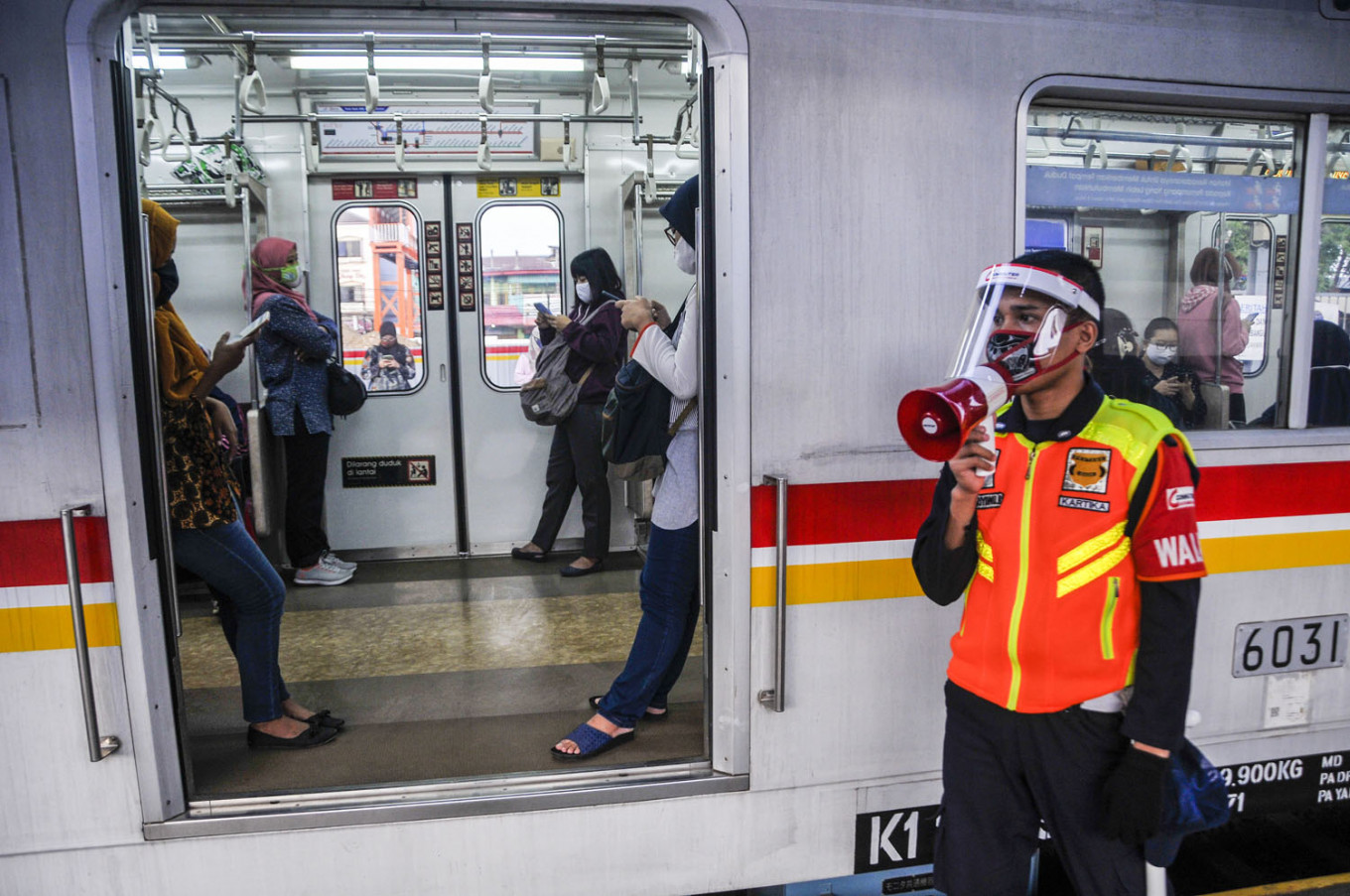Popular Reads
Top Results
Can't find what you're looking for?
View all search resultsPopular Reads
Top Results
Can't find what you're looking for?
View all search resultsGreater Jakarta transit has bumpy road ahead
Severe traffic congestion has prompted the government to improve urban mobility in Greater Jakarta by encouraging more people to switch from private vehicles to mass transit. But the ongoing COVID-19 outbreak is undeniably hindering this agenda, with demand for public transit slumping in recent months as a result of social distancing and fears of contagion.
Change text size
Gift Premium Articles
to Anyone
S
evere traffic congestion has prompted the government to improve urban mobility in Greater Jakarta by encouraging more people to switch from private vehicles to mass transit.
But the ongoing COVID-19 outbreak is undeniably hindering this agenda, with demand for public transit slumping in recent months as a result of social distancing and fears of contagion.
Yet, despite the unforeseen impacts, the authorities are sticking with their plan to increase ridership by 2029.
Transportation Minister Budi Karya Sumadi is aware that fear of contagion has discouraged people from public transit.
"Therefore, the government is trying hard to restore [the demand for public transit] by ensuring the availability of various modes of transportation and enforcing health protocols at departure, during travel and upon arrival," Budi said in a public discussion on Wednesday.
The health crisis has hit public transit companies hard. State-owned Commuter Line operator PT KCI recorded a 70 percent decrease in the number of passengers in April, while city-owned operators of MRT trains and Transjakarta buses each reported a 90 percent drop in ridership in the same month.
Public transit ridership slowly increased after the Jakarta administration allowed businesses to gradually reopen starting in June. Yet, operators have cut passenger capacity to maintain safe distances between passengers during the outbreak.
Six out of 10 commuters in Greater Jakarta said they would return using the services once the outbreak receded, according to the latest survey by the Indonesia Transportation Society (MTI) that indicates a glimmer of hope for future urban mobility.
“We are quite relieved knowing that 66 percent of 209 respondents surveyed said they would return to public transportation despite 35.41 percent of them also saying they might reduce the frequency of mass transportation usage,” MTI secretary general Harya S. Dillon said on Tuesday.
The government aims to increase the share of public transportation in Greater Jakarta to 60 percent by 2029. Before the outbreak, people using public transit accounted for 32 percent of mode share in Greater Jakarta.
“The share decreased because of the pandemic but we’re trying to keep up with the set target of 60 percent by 2029. We need big efforts,” the Transportation Ministry's Greater Jakarta Transportation Agency (BPTJ) head, Polana B. Pramesti, said.
Jakarta Transportation Agency head Syafrin Liputo revealed that even the rapid development of transportation infrastructure in Indonesia’s capital in the past two decades had failed to help increase the share of public transportation in the city -- which stood at 21.7 percent last year.
MTI’s Harya highlighted a 2019 Statistics Agency (BPS) commuter survey, which found that over 70 percent of commuters preferred not to use public transportation because of the long travel times and perception that it was impractical. He said the same reasons might apply today during the outbreak.
Harya urged the government to accelerate the ongoing integration of a vast transit network across Greater Jakarta and develop an integrated ticketing system that would improve passenger experience and thereby encourage them to return to public transportation after the pandemic receded.
Both Syafrin and Polana said authorities and transit operators were striving for multimode integration, particularly after they recently rolled out an even larger integration plan.
In February, the central government and the Jakarta administration established a joint venture called PT Moda Integrasi Transportasi Jabodetabek (MITJ) to integrate various transportation modes in Greater Jakarta. The company officially kicked off its work by revamping four transit hubs in Jakarta earlier this year.
Three city-run companies and the MITJ also recently established a joint venture called Jak Lingko Indonesia to build an integrated payment system between angkot (public minivans), Transjakarta buses and the MRT and Commuter Line trains that is expected to be ready by 2021.
Syafrin said the city administration was also seeking to increase parking fees this year and impose electronic road pricing (ERP), a project that has long been suspended, estimated within two years.
BPTJ spokesperson Budi Rahardjo said, however, the government’s focus for the time being was to maintain public trust for people who were still using public transportation by enforcing strict health protocols.
“With consistent efforts to prevent public transportation from becoming a place to catch COVID-19, hopefully, we can maintain public trust in transit systems despite the declining demand,” he told The Jakarta Post.










